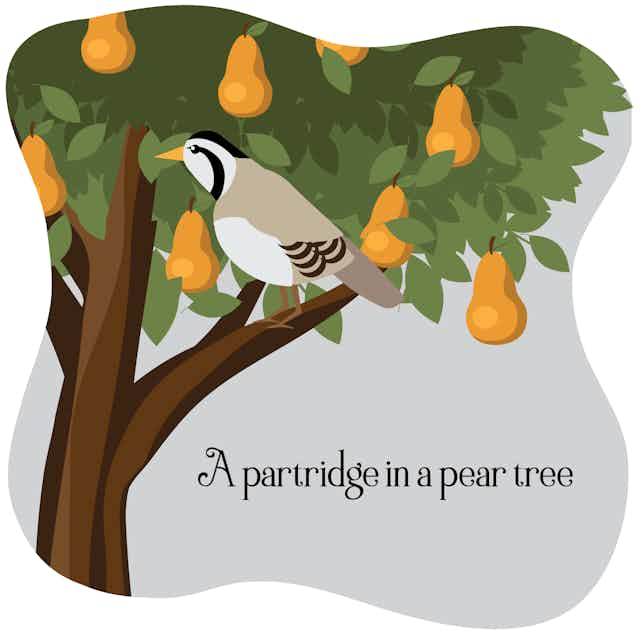Never has a song epitomised conspicuous consumption so tellingly as the [Twelve Days of Christmas](https://en.wikipedia.org/wiki/The_Twelve_Days_of_Christmas_(song). And the gifts mentioned come at quite a price. Last year, Fortune’s Christmas Price Index estimated that the cost of all of the presents mentioned in the song – from the patridge in the pear tree to the gold rings – was $27,673 (£18,500), or $116,273 (£80,000) if you calculate the cumulative total of 364 gifts, taking into account all of the repetitions.
So perhaps we should use this popular seasonal song to help us think specifically about our own choices and our planet’s future as we enter the festive period of bingeing and consumption.
The “fowl”-heavy gift list would suggest that the recipient is a robust, game-eating omnivore. Partridge, hens and geese are traditional festive foods, but the rearing and consumption of all of these has an impact in terms of sustainability. Partridges are a red-listed species and need to be managed effectively in order to maintain their declining populations. Chickens are in no such immediate danger, but many live miserable lives, even with the new UK rules on husbandry. The choice of a goose for Christmas dinner is likely to be a more sustainable one, however, since most are bred in small flocks by small-scale farmers and their production has yet to be overly mechanised.
Costly milkmaids
Milk and cream consumption peaks at Christmas, but the milkmaids of the song hark back to a pre-mechanical era – and these days most milk is produced in high-tech dairies. The spectre of industrial mega dairies containing tens of thousands of cows is increasingly likely as farmers struggle to make a living out of small-scale production. We should also remember that milk is not produced without various unfortunate by-products, including calves.
Given the animal welfare, social and environmental impacts of festive fodder, perhaps the best, most sustainable choice would be to have a vegetarian or even vegan Christmas dinner. Failing that, we could all consider Arnold Schwarzenegger’s advice and eat less meat – not just at Christmas but throughout the year.
What price peace?
Doves have been a Christian symbol of love and peace since biblical times and are universally associated with hope. It is almost impossible to put a price on peace, but the costs of unrest and war in 2015 have been estimated by the Institute for Economics and Peace at more than 13.4% of global GDP, or around £9.21 trillion. Turtle doves, like global peace are in decline – and there is a real fear for their extinction.

The blackbirds, the calling birds of the song, are common and their song is heard almost everywhere. Sadly, most of us don’t listen – one gift to ourselves would be to pay more attention so that we are more in tune with the natural world around us.
The five gold rings are thought to refer to ring-necked pheasants or even goldfinches, but most of us think about jewellery when we hear this – and most of us would like to receive something precious as a Christmas gift.
Sadly, gold is rarely a sustainable choice and Stephanie Boyd’s film The Price of Gold, certainly makes disturbing viewing. Perhaps it should make us reconsider the desirability of giving or receiving this precious metal.
Count your blessings
A long running myth is that the Queen owns all the “swans-a-swimming” in England, but the story probably stems from old traditions such as swan-upping, the annual census of swan numbers on the Thames.
The notion of privilege is a strong theme in the song with “ladies dancing” and “lords a-leaping”, bringing a vision of old-fashioned privilege to our minds. Certainly privilege is apparent in the UK, the most unequal country in the EU – and few of us will ever reach Lord or Lady status, never mind enjoy the associated wealth or influence.

Instead of feeling marginalised and resentful about our own limited material wealth or power, however, perhaps we should reflect on our privilege. The Twitter hashtag #firstworldproblems, has possibly been overused of late, but the sentiments behind it are increasingly relevant. In a world of unrest, ill-health, war and disaster, there has never been a better time to count our blessings and use our emotional energies to find solutions.
The finale of the song sees gifts of music from pipers and drummers. This year we may have something to make a noise about. The Paris Climate agreement gives the world hope that we can find solutions to climate change, and prevent the worst-case climate scenarios. The power of civil society in pressurising governments around the world to agree to ambitious targets has been demonstrated, and perhaps we, the public, are now calling the tunes. It’s time politicians the world over began marching to a different drum beat.

